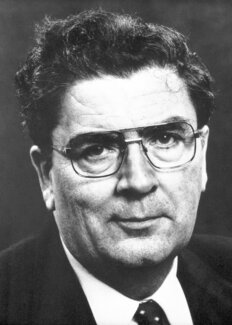John Hume
Biographical

John Hume is married to Pat and they have three daughters and two sons.
He was a leader of the non-violent Civil Rights Movement in 1968 to 1969 having established a record of community leadership through his founding role in Derry Credit Union, Derry Housing Association and his organisation of the “University for Derry” campaign. He was elected as an Independent to the Stormont Parliament in February 1969 for the Foyle Constituency. His manifesto committed him to forming a political party on the European social Democratic model. He did this with five other Stormont MPs and one Senator in August 1970. From its formation until 1979 he was the SDLP’s Deputy Leader and has been Leader since 1979.
John’s elective career has included membership of the Northern Ireland Assembly in 1973 to 1974, the Constitutional Convention in 1975, election to the European Parliament in 1979 (re-elected 1983, 1987, 1992, and 1997).
A key advocate of partnership, he played a major role in negotiating the Sunningdale Agreement. In the resulting Power-Sharing Executive of 1974, he served as Minister of Commerce.
In the period 1977 to 1979, John served as a Special Adviser to EC Commissioner Richard Burke.
As MEP he sits on the front Bench of the Socialist Group which is the largest group in the European Parliament. John has served on the Committee for Regional Planning and Regional Policy since 1979. He wrote the report on Regional Problems of Ireland (1987).
As Leader of the SDLP, he has led the Party in the New Ireland Forum Talks 1983, the Brooke Talks 1992, the Forum for Peace and Reconciliation 1994 and the recent All Party Talks which led to the Good Friday Agreement.
John Hume began talks with Gerry Adams with the stated objective of bringing an end to violence followed by All Party Talks, the objective of which was agreement that had to have the allegiance of both traditions.
John founded Derry-Boston Ventures and Boston-Ireland Ventures as part of the strategy to win new inward investment, marketing opportunities and trade/industry partnerships. He was co-leader of International Observer delegation – Philippino Presidential Elections (1995).
| Awards |
| Irish “People of the Year” Award (1984) |
| American Federation of Teachers Human Rights Award (1986) |
| St. Thomas More Award, University of San Francisco (1991) |
| Irishman of the Year (1992). Awarded by “Irish Abroad” |
| International League for Human Rights Award for Peace and Human Rights (1994) |
| Order of Thomas More, University of St. Louis (1994) |
| Pio Manzu Medal, November 1994 |
| Communicators of the Year Award (RNID), July 1995 |
| European of the Year Award |
| President Roosevelt Award, May 1996 |
| International Human Rights Award, 21 May 1996 |
| Global Citizens Award, January 1998 |
| Sean Mc Bride Peace Award, October 1998 |
| Nobel Peace Prize, 10 December 1998 |
| Honorary doctorates |
| University of Massachusetts 1985 |
| Catholic University of America 1986 |
| St. Joseph’s University, Philadelphia 1986 |
| Tusculum College, Tennessee Presbyterian University of America 1998 |
| Dublin City University 1994 |
| Boston College 1995 |
| Suffolk University 1995 |
| University of Nice, France, November 1995 |
| University of Notre Dame, Indiana 25 April 1996 |
| University of St. Andrew, 20 June 1996 |
| University of College Galway, 24 June 1996 |
| University of Santa Clara, June 1997 |
| University of Missouri, January 1998 |
This autobiography/biography was written at the time of the award and later published in the book series Les Prix Nobel/ Nobel Lectures/The Nobel Prizes. The information is sometimes updated with an addendum submitted by the Laureate.
John Hume died on 3 August 2020.
Nobel Prizes and laureates
Six prizes were awarded for achievements that have conferred the greatest benefit to humankind. The 12 laureates' work and discoveries range from proteins' structures and machine learning to fighting for a world free of nuclear weapons.
See them all presented here.
